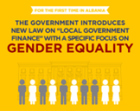1 - 12 of 12 Results
Date:
This article provides an overview of the main forms of violence against women and girls, along with other commonly used terms, that any gender equality activist should have in their vocabulary toolkit. Attached, you will also find a picture to illustrate the article above.
Date:
As part of the Generation Equality campaign, seven distinguished local artists – from Albania, Georgia, Kosovo[1], Moldova, North Macedonia, Turkey, and the curator of the initiative from the United States of America – are starting a conversation on gender equality through mural art in Europe and Central Asia.
Date:
The survey measured the socio-economic impact of the pandemic and how it affected the livelihoods of women and men. It shows that COVID-19 has been disproportionately affecting women compared to men, and risks to deepen gender inequalities.
Date:
More than half of municipalities in Albania have a dedicated mechanism that aims to protect and support survivors of domestic and gender-based violence. It is composed of a team of community professionals who have institutional responsibility to respond and address the various needs of survivors of domestic violence.
Date:
UN Women supported the exhibition, which was conceptualized by five young artists as part of the 16 Days of Activism against Gender-Based Violence.
Date:
Students, women from different walks of life and survivors of domestic violence were trained on self-defense and personal safety during the 16 Days of Activism.
Date:
Esmeralda, Luisita and Vjola are active young women helping other women to have a life of dignity and freedom. They represent some of the institutions that are part of the Referral Mechanism in the municipality of Kamza, Albania.
Date:
On 11 September 2018 Albania adopted the country’s first National Action Plan (NAP) for the implementation of the UN Security Council resolution (UNSCR) 1325 on Women, Peace and Security after two years of intensive work by the government, civil society and international partners. We recently spoke to the government and civil society representatives who have contributed greatly into the development and adoption of the NAP about how this plan will contribute to the life of women and girls in the country.
Date:
In Albania, UN Women is working to make gender equality central to planning and budgeting for national development and EU integration. When it comes to applying gender-responsive budgeting in public finance, the country is recognized as a regional leader.
Date:
In May 2017, the Government of Albania introduced a new law on “Local Government Finance” with a specific focus on advancing gender equality in national and local budgeting and policy making.
Date:
Infographics on Gaps in Response to Violence Against Women and Girls by Albania, Bosnia and Herzegovina, the former Yugoslav Republic of Macedonia, Montenegro, Serbia, and Turkey
Date:
Gender-responsive budgeting is an innovative public policy tool that comprehensively assesses gender gaps in public budgets and identifies key actions to close them. In Albania, almost all ministries now have clear gender equality objectives in their budget planning. In 2017, they have committed a total of USD 91 million, the largest state budget committed to advancing gender equality in the country.











